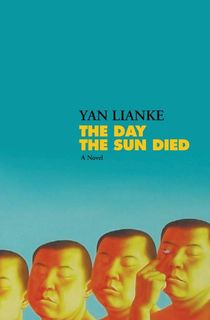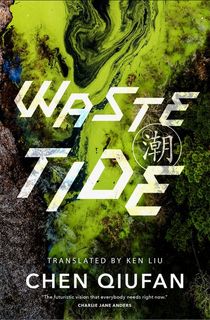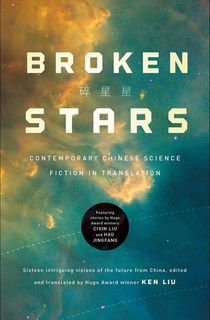Over the course of the past decade or so, there’s been a major rise in the prominence of Chinese science-fiction and fantasy. Some of this can be traced back to the surprise success of The Three-Body Problem, an epic and highly cerebral sci-fi story about alien invasion written by Cixin Liu.
After winning the Hugo Award for Best Novel, Liu’s work became a bestseller (as well as a recommended read from Barack Obama!) Now, it’s the focus of a big-budget Netflix adaptation from the team behind Game of Thrones. Since then, we’ve been treated to an influx of works from Chinese authors as well as American and Canadian writers of Chinese descent, many of whom root their works in the country’s rich mythology.
If you liked The Three-Body Problem, here are seven novels to check out now.
More Chinese Spec-Lit Like The Three Body Problem

The Day the Sun Died
Li Niannian lives in a seemingly normal town nestled deep in the Balou Mountains of China, but things are getting weird. One night, as the locals would usually be settling down for the night, they pour into the streets, asleep yet not.
They are dreamwalking, carrying on with their daily business as if the sun hadn’t already gone down. More and more people are succumbing to this condition, and if Li can't stop it now, all hell will break loose. If the sun doesn't rise, their lives will come to an end.

Vagabonds
In 2096, the war of independence breaks out on Mars and leads to a rift between Earth and the red planet. A hundred years later, a group of kids are sent to Earth as delegates from Mars as part of efforts to bring peace to these warring worlds. These children are sent to study the history and culture of the rival planet and teach their long-time adversaries about their own lives.
But the longer they spend on Earth, the more they find themselves caught between the two planets. All eyes are on them, and how they act next could mean peace for the solar system or outright destruction.

Waste Tide
Mimi is a "waste girl," a member of the lowest caste on Silicon Isle, a heap of electronic waste located off the coast of China. Mimi is one of thousands who work day and night to process the waste sent here from around the world.
Three clans rule the isle, where a vicious social hierarchy reigns. Luo Jincheng is the head of one of these clans, and as the government enforces new restrictions on the isle, it's his job to tighten the reins on his waste workers. Scott Brandle has come to Silicon Isle representing TerraGreen Recycling, an American corporation who want to turn the island into a multi-trillion-dollar processing plant. Chen Kaizong, his Chinese-American translator, wants to find clues to her heritage.
On this overcrowded isle far from land, tensions are rising and a dark futuristic virus is about to be unleashed.

Cat Country
Originally published in 1932, Lao She's satirical novel Cat Country is widely considered to be one of the most prominent forms of sci-fi in 20th-century China, as well as one of its most influential. The book is intended to be a satire akin to Gulliver's Travels, with a focus on the political indoctrination of Chinese society.
When a traveler from China crash-lands on Mars, he finds himself in a country inhabited entirely by Cat People. The feline population have their own language, arts, and catnip-heavy diet. It's also a world ripe with misogyny, corruption, and injustice that rings a little too close to home for our human protagonist.

Broken Stars
Aside from being a multi-award-winning sci-fi and fantasy author himself, with the likes of The Dandelion Dynasty under his belt, Ken Liu is also a celebrated translator. You've probably seen his name credited on works by the likes of Cixin Liu and Hao Jingfang.
The 2019 anthology Broken Stars includes works by several notable Chinese sci-fi authors, such as Liu, Zhang Ran, Tang Fei, and Baoshu. These works tackle a variety of themes and ideas. Liu's "Moonlight" follows a man who is contacted by three future versions of himself, each trying to save their world from destruction. Tang Fei's title story shows a young girl who can read the future in the stars. The book also contains essays on Chinese sci-fi, its growing fandom, and the expansion of the genre in the country.

Song of Silver, Flame of Night
Lan was once a normal human with a different name. Now she's a song-girl in Haak’gong, a city transformed by the Elantian colonizers who invaded her kingdom and killed her mother. Banned from using the magic of her people, Lan scours the remnants of this city looking for clues to her past and the means to understand the strange mark burned into her arm by her mother in her last act before she died.
Only she can see the mark, right up until a mysterious magical practitioner named Zen appears at her teahouse and saves her life. He recognizes her immediately as one of his kind and says the answers she seeks may lie deep in the pine forests and misty mountains of the Last Kingdom. There, they could find the means to overthrow the Elantians, but their powers could also destroy everything they hold dear.

Shanghai Immortal
Pawned by her mother to the King of Hell as a child, Lady Jing is a hybrid of human, vampire, and hulijing fox-spirit. As the King's ward, her job over the past century or so has been to run errands and be a beleaguered dogsbody. When she overhears the deceitful courtiers plotting to steal a priceless dragon pearl from the King, she seizes her chance to expose them and be a hero for once.
With the help of a gentle mortal tasked with setting up the Central Bank of Hell, Jing embarks on a wild chase for the pearl that leads her through both the darkest realms of Hell and the mortal world of Shanghai. But vengeance might give way to something even scarier for Jing: Love.
Featured image: Netflix / YouTube





